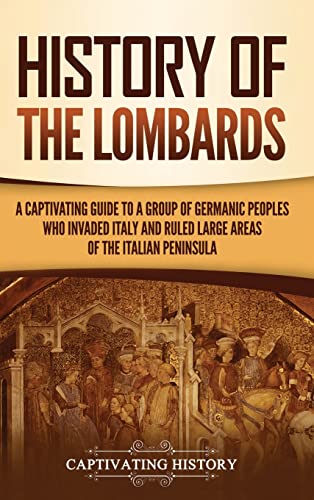
History of the Lombards: A Captivating Guide to a Group of Germanic Peoples Who Invaded Italy PDF
Preview History of the Lombards: A Captivating Guide to a Group of Germanic Peoples Who Invaded Italy
Why is a region in northern Italy called Lombardy?
It was named after the Germanic barbarians known as the Lombards. As one of several founding ethnic groups, they left their mark on the peninsula. They established dukedoms that set the country on a path to the formation of many independent city-states during the Late Middle Ages.
Previously a nomadic people, who, according to legend, came from Scandinavia, the Lombards settled first in northern Italy or what is today called Lombardy and then later expanded their kingdom to encompass most of Italy, from the Alps to Mezzogiorno, or southern Italy.
The Lombards, living up to their designation as barbarians by the Romans, were a warlike people. The chronicle of their history is one of battles against other barbarian tribes, the Romans, the Byzantines, Muslims, and the pope and his army. The Lombards were finally removed from power by the overwhelming forces of Charlemagne in northern Italy and the Normans in the south.
From time to time, the Lombards fought enemies on all fronts. But their most intriguing struggles were against each other. Claimants to the throne and regional dukes continuously vied for power. They were invariably duplicitous in negotiations and sought allies wherever they could find them. The Lombard duchies were conquered one after another by foreign invaders, and their culture and language gradually disappeared, being absorbed into the matrix of cultures that subsequently came to dominate Italy.
In this book, you will learn:
The route the nomadic Lombards followed as they migrated from northern Germany to Italy.
How the Lombards eventually turned against the Romans who invited them to settle in Italy.
How the first Lombard king in Italy was murdered in 572 CE by his wife as revenge for the murder of her father.
Why the Lombards reinstituted their kingship after ten years of managing without a king.
The intricacies of Lombard strategic alliances that allowed them to expand their kingdom from the north of Italy to the southern tip of the Italian Peninsula.
Why the Lombards gradually abandoned a heretical Christian sect and adopted orthodox Catholicism.
The role played by a traveling Irish monk who established monasteries in Lombardy.
How the chronicler of the Lombards, Paul the Deacon, came to write the history of his people.
What the Lombard laws tell us about the people's culture.
How the Lombard rule in northern Italy collapsed before Charlemagne's army and the Normans' success in ending Lombard rule in southern Italy.
